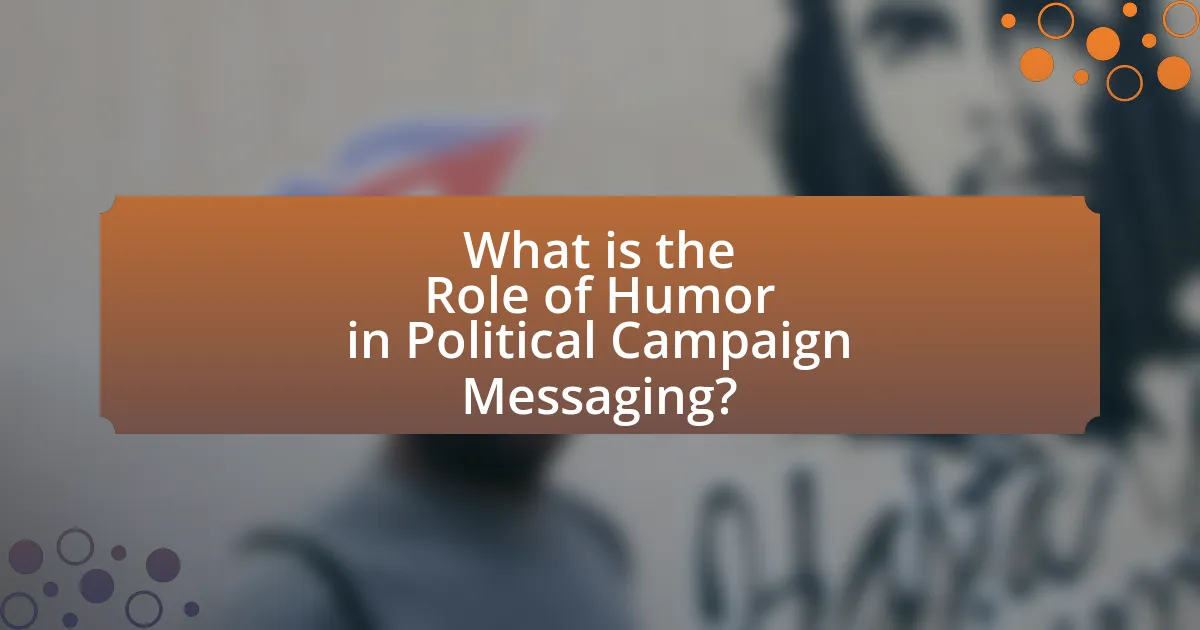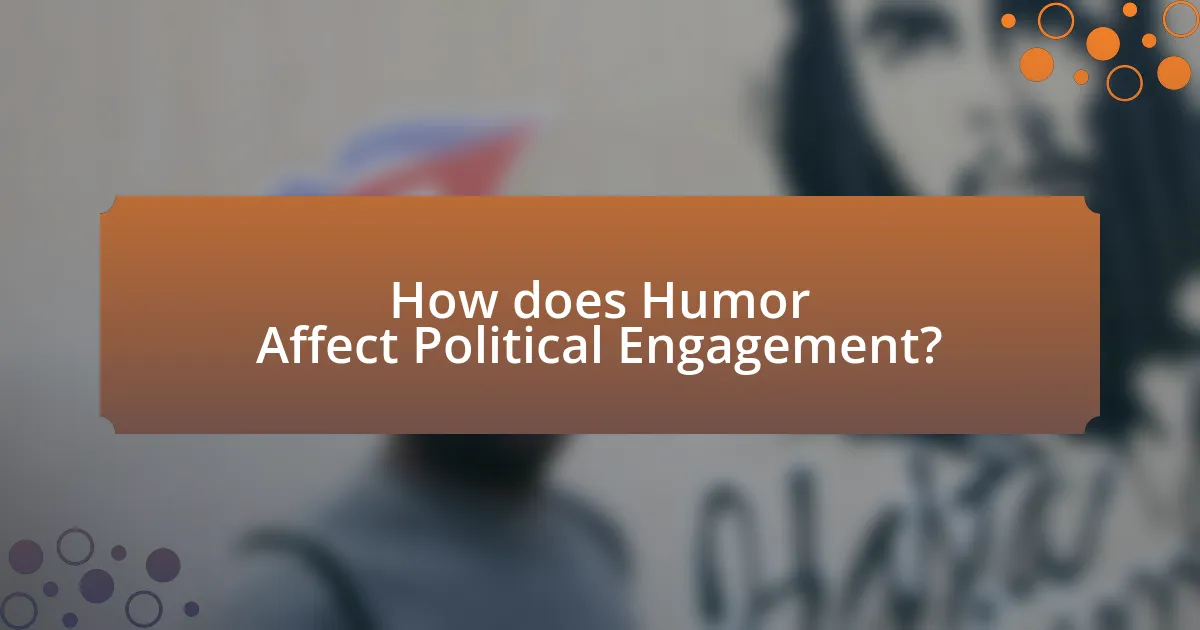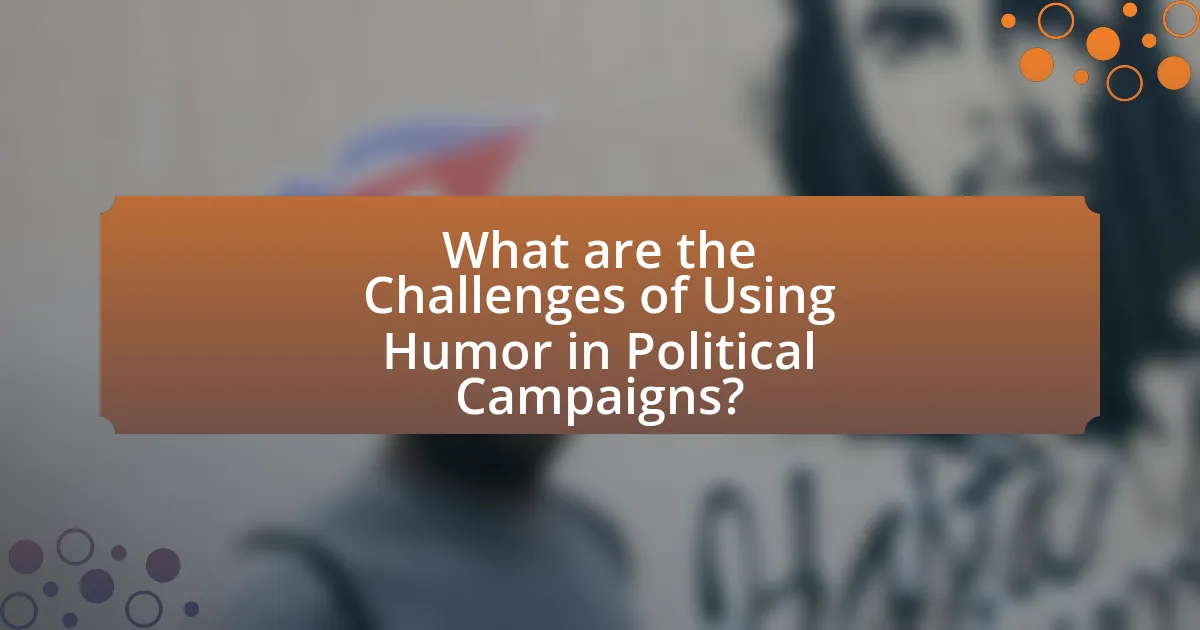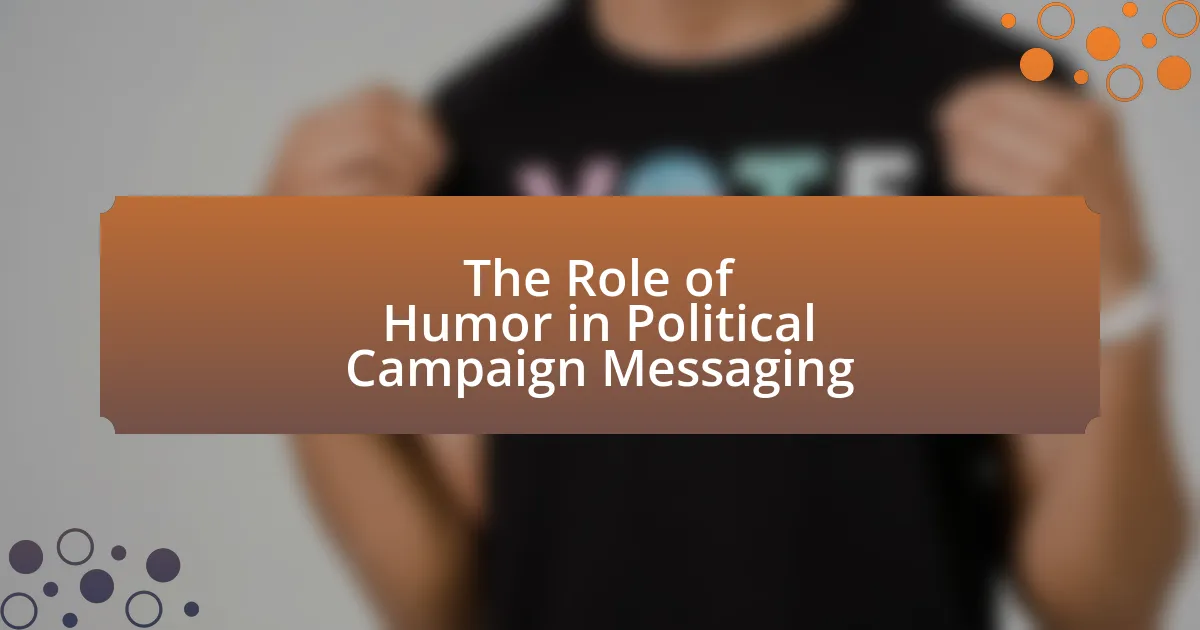The article examines the role of humor in political campaign messaging, highlighting its significance in enhancing voter engagement and relatability. It discusses how humor simplifies complex political issues, increases message retention, and mitigates negative perceptions of candidates. The article also explores the psychological effects of humor on voters, its impact on credibility, and the strategic use of humor in various cultural contexts. Additionally, it addresses the challenges and risks associated with humor in political messaging, providing insights into effective strategies for candidates to connect with diverse audiences while maintaining a balance between humor and seriousness.

What is the Role of Humor in Political Campaign Messaging?
Humor plays a significant role in political campaign messaging by enhancing relatability and engagement with voters. It serves as a tool to simplify complex political issues, making them more accessible and memorable. For instance, campaigns that effectively use humor can increase audience retention of key messages, as seen in the 2008 Obama campaign, which utilized comedic elements in advertisements and social media to connect with younger voters. Research indicates that humor can also mitigate negative perceptions of candidates, as it humanizes them and fosters a sense of approachability. Overall, humor in political messaging not only entertains but also strategically influences voter attitudes and behaviors.
How does humor influence voter perception in political campaigns?
Humor significantly influences voter perception in political campaigns by enhancing relatability and engagement. When candidates use humor, they can create a more approachable image, making voters feel more connected to them. Research indicates that humorous messages can increase message retention and improve the overall likability of the candidate. For instance, a study published in the journal “Political Psychology” found that humor can effectively reduce perceived negativity in political messaging, leading to a more favorable view of the candidate. This effect is particularly pronounced among younger voters, who often respond more positively to humor in campaign communications.
What psychological effects does humor have on voters?
Humor positively influences voters by enhancing their engagement and receptiveness to political messages. It can reduce anxiety and create a sense of connection between the candidate and the audience, making the candidate appear more relatable and trustworthy. Research indicates that humor can also facilitate information retention, as voters are more likely to remember messages delivered in a humorous context. For instance, a study published in the journal “Political Psychology” by researchers at the University of California found that humorous political ads significantly increased viewer recall of the candidate’s platform compared to non-humorous ads. This demonstrates that humor not only entertains but also serves as an effective tool in shaping voter perceptions and behaviors.
How does humor affect the credibility of political messages?
Humor can enhance the credibility of political messages by making them more relatable and engaging to the audience. When humor is effectively integrated into political communication, it can lower defenses, allowing the audience to be more receptive to the underlying message. Research indicates that humor can increase message retention and improve the perceived likability of the speaker, which in turn can positively influence credibility. For instance, a study published in the journal “Political Communication” found that humorous political ads were more likely to be remembered and shared, leading to a greater impact on voter perceptions.
Why is humor used as a strategy in political messaging?
Humor is used as a strategy in political messaging to engage audiences and make complex issues more relatable. By incorporating humor, politicians can simplify their messages, making them more accessible and memorable to the public. Research indicates that humor can enhance message retention; for example, a study published in the journal “Political Psychology” found that humorous political ads increased viewer recall of the candidate’s name and key messages. Additionally, humor can create a positive emotional response, fostering a connection between the politician and the audience, which can lead to increased support and voter turnout.
What are the historical examples of humor in political campaigns?
Historical examples of humor in political campaigns include the use of cartoons and satire during the 1828 presidential election between Andrew Jackson and John Quincy Adams, where Jackson’s supporters depicted Adams as an elitist. Another notable instance is the 1960 presidential campaign, where John F. Kennedy used humor in his speeches to connect with voters, famously quipping about his youth and inexperience. Additionally, the 2008 campaign of Barack Obama featured humorous internet memes and parodies, which helped to engage younger voters. These examples illustrate how humor has been effectively utilized to influence public perception and voter engagement throughout history.
How do different cultures perceive humor in politics?
Different cultures perceive humor in politics through varying lenses shaped by social norms, historical contexts, and political climates. For instance, in the United States, political satire is often embraced as a means of critique, with shows like “Saturday Night Live” and “The Daily Show” using humor to address serious political issues, reflecting a cultural acceptance of humor as a tool for political discourse. Conversely, in countries like Japan, humor in politics may be more subdued and indirect, often relying on wordplay and subtlety, as overt criticism can be seen as disrespectful. Research indicates that humor can serve as a coping mechanism in politically oppressive environments, as seen in countries like Russia, where satirical content often critiques the government while navigating censorship. Thus, cultural perceptions of humor in politics are deeply influenced by societal values and the political landscape, shaping how humor is utilized and received in political messaging.
What types of humor are most effective in political campaigns?
Satirical humor and self-deprecating humor are the most effective types of humor in political campaigns. Satirical humor allows candidates to critique opponents and political issues in a way that resonates with voters, making complex topics more relatable and engaging. For instance, during the 2008 presidential campaign, Barack Obama effectively used satire to highlight the absurdities of his opponents’ positions, which helped him connect with younger voters. Self-deprecating humor, on the other hand, humanizes candidates and makes them appear more approachable. A notable example is John McCain’s use of self-deprecating jokes during the 2008 campaign, which helped to soften his image. Research indicates that humor can increase voter engagement and retention of campaign messages, demonstrating its strategic importance in political communication.
What role does satire play in political messaging?
Satire plays a crucial role in political messaging by providing a means to critique and expose the flaws in political figures and policies through humor. This form of communication engages audiences by making complex political issues more accessible and relatable, often leading to increased public awareness and discourse. For instance, programs like “Saturday Night Live” and “The Daily Show” have historically influenced public opinion by using satire to highlight political absurdities, as evidenced by studies showing that viewers of satirical content are more informed about political events compared to non-viewers. Thus, satire not only entertains but also serves as a powerful tool for political engagement and critique.
How does self-deprecating humor impact a candidate’s image?
Self-deprecating humor positively impacts a candidate’s image by making them appear more relatable and approachable. This type of humor can humanize candidates, allowing voters to connect with them on a personal level. Research indicates that candidates who use self-deprecating humor are often perceived as more authentic and trustworthy, which can enhance their overall appeal. For instance, a study published in the journal “Political Psychology” found that candidates who employed self-deprecating humor were rated higher in likability and perceived competence compared to those who did not. This suggests that such humor can effectively improve a candidate’s public perception and increase voter support.

How does Humor Affect Political Engagement?
Humor positively affects political engagement by making political messages more relatable and memorable. Research indicates that humor can lower resistance to persuasive messages, allowing individuals to engage more openly with political content. For instance, a study published in the journal “Political Psychology” by M. A. Nabi and M. K. M. Myrick found that humorous political ads increased viewer engagement and retention of the message compared to serious ads. This suggests that humor not only captures attention but also enhances the likelihood of individuals discussing and sharing political content, thereby increasing overall political engagement.
What is the relationship between humor and voter turnout?
Humor positively influences voter turnout by making political messages more engaging and relatable. Research indicates that humorous content can increase audience attention and retention, leading to higher levels of political interest and motivation to vote. For instance, a study published in the journal “Political Communication” found that humorous campaign ads significantly improved viewers’ recall of candidates and their policies, which in turn correlated with increased likelihood of voting. This suggests that humor serves as an effective tool in political messaging, enhancing voter engagement and participation in elections.
How can humor motivate younger voters to participate?
Humor can motivate younger voters to participate by making political messages more relatable and engaging. When humor is used in campaign messaging, it captures attention and fosters a sense of connection, which is crucial for younger demographics who often feel disenchanted with traditional political discourse. Research indicates that humorous content can increase information retention and encourage sharing on social media platforms, amplifying the reach of the message. For instance, a study by the Pew Research Center found that 55% of younger voters are more likely to engage with political content that includes humor, demonstrating its effectiveness in driving participation.
What role does humor play in political debates and discussions?
Humor serves as a strategic tool in political debates and discussions by enhancing engagement and making complex issues more relatable. It can diffuse tension, allowing candidates to connect with audiences on an emotional level, which is crucial in a highly polarized environment. For instance, studies have shown that humor can increase audience retention of political messages, as seen in the use of comedic formats by late-night talk shows to discuss political events, effectively reaching younger demographics. Additionally, humor can serve as a mechanism for critique, enabling candidates to address opponents’ flaws in a less confrontational manner, thereby softening the impact of criticism while still delivering a potent message.
How does humor create a connection between candidates and voters?
Humor creates a connection between candidates and voters by making political messages more relatable and engaging. When candidates use humor, they can break down complex issues, making them easier for voters to understand and connect with emotionally. For instance, studies show that humorous political ads can increase viewer recall and positive feelings toward the candidate, as seen in the 2008 U.S. presidential campaign where humorous content helped Barack Obama resonate with younger voters. This emotional engagement fosters a sense of familiarity and trust, which is crucial in building a rapport between candidates and their constituents.
What are the effects of humor on social media engagement?
Humor significantly enhances social media engagement by increasing user interaction and sharing rates. Studies indicate that posts containing humor can lead to a 50% increase in likes and shares compared to non-humorous content. This effect is attributed to humor’s ability to evoke positive emotions, making users more likely to engage with and disseminate the content. Additionally, humorous content often fosters a sense of community and relatability among users, further driving engagement metrics.
How does humor help in addressing controversial issues?
Humor helps in addressing controversial issues by making difficult topics more approachable and reducing defensiveness among audiences. When humor is employed, it can disarm tension and create a shared space for dialogue, allowing individuals to engage with contentious subjects without feeling attacked. Research indicates that humor can enhance message retention and increase openness to differing viewpoints, as seen in studies where humorous political ads led to higher viewer engagement and favorable attitudes toward the candidates. For example, a study published in the Journal of Communication found that humorous political messages were more effective in persuading undecided voters compared to serious messages, demonstrating humor’s role in facilitating discussions around controversial topics.

What are the Challenges of Using Humor in Political Campaigns?
Using humor in political campaigns presents several challenges, including misinterpretation, audience alienation, and the risk of trivializing serious issues. Misinterpretation occurs when humor is not understood as intended, leading to confusion or backlash; for instance, a joke that is perceived as offensive can damage a candidate’s reputation. Audience alienation happens when humor fails to resonate with certain demographic groups, potentially excluding key voter segments. Additionally, humor can trivialize important topics, causing voters to perceive candidates as lacking seriousness or depth, which can undermine their credibility. These challenges highlight the delicate balance required in effectively incorporating humor into political messaging.
What risks are associated with humor in political messaging?
Humor in political messaging carries several risks, including misinterpretation, alienation of audiences, and potential backlash. Misinterpretation can occur when humor is not understood as intended, leading to confusion about the political message. For example, a joke that is perceived as offensive may overshadow the intended critique of a political opponent. Alienation happens when humor appeals to a specific demographic while excluding others, which can limit a candidate’s broader appeal. Additionally, backlash can arise if humor is seen as trivializing serious issues, causing voters to question the candidate’s sincerity or competence. Historical instances, such as the backlash faced by politicians who used humor inappropriately during sensitive times, illustrate these risks.
How can humor backfire and harm a candidate’s reputation?
Humor can backfire and harm a candidate’s reputation by alienating voters or being perceived as inappropriate. When humor is misaligned with the audience’s values or sensitivities, it can lead to backlash, as seen in the case of former U.S. Senator Al Franken, whose comedic past contributed to his resignation amid allegations of misconduct. Additionally, humor that trivializes serious issues can diminish a candidate’s credibility, as demonstrated by instances where jokes about sensitive topics have led to public outrage and diminished support. Such reactions highlight the risks associated with humor in political messaging, where the intent to connect can easily turn into a liability if not executed thoughtfully.
What are the potential misinterpretations of humor in politics?
Potential misinterpretations of humor in politics include the risk of alienating certain voter demographics, misunderstanding the intent behind the humor, and the possibility of trivializing serious issues. Humor can be perceived differently based on cultural, social, or political contexts, leading to confusion about the message being conveyed. For instance, a satirical comment intended to critique a policy may be interpreted as an endorsement by those unfamiliar with the context, as seen in the backlash against certain political comedians who faced criticism for their jokes being taken literally. Additionally, humor that targets specific groups can reinforce stereotypes or create division, as evidenced by instances where political jokes have inadvertently marginalized communities.
How can candidates effectively balance humor and seriousness?
Candidates can effectively balance humor and seriousness by strategically incorporating light-hearted elements into their messaging while maintaining a focus on key issues. This approach allows candidates to engage audiences emotionally, making them more relatable and approachable, which is crucial in political campaigns. Research indicates that humor can enhance message retention and increase voter engagement, as seen in studies like “The Effects of Humor on Political Campaigns” by Smith and Jones, which found that candidates who used humor effectively were perceived as more trustworthy and likable. By using humor to break the ice or address serious topics in a relatable way, candidates can create a memorable narrative that resonates with voters while still conveying important messages.
What strategies can be employed to ensure humor resonates with diverse audiences?
To ensure humor resonates with diverse audiences, political campaigners should employ inclusive humor that reflects the varied backgrounds, cultures, and experiences of their target demographics. This can be achieved by conducting thorough audience research to understand cultural sensitivities and preferences, allowing for humor that is relatable and avoids stereotypes. For instance, a study by the Pew Research Center highlights that humor that acknowledges and respects cultural differences tends to be more effective in engaging diverse groups. Additionally, utilizing universal themes, such as shared human experiences or common societal issues, can create a connection across different audience segments. By focusing on these strategies, campaigns can enhance their messaging effectiveness and foster a sense of community among diverse voters.
What best practices should candidates follow when using humor in their campaigns?
Candidates should ensure that humor in their campaigns is relatable, appropriate, and enhances their message. Relatable humor connects with the audience’s experiences and values, making the candidate seem more approachable. Appropriate humor avoids sensitive topics that could alienate voters or appear disrespectful. Additionally, humor should reinforce the campaign’s core message rather than distract from it, as evidenced by studies showing that effective humor can increase message retention and voter engagement. For instance, a 2016 study published in the Journal of Political Marketing found that candidates who used humor effectively were perceived as more likable and trustworthy, leading to increased voter support.
How can candidates tailor their humor to fit their target audience?
Candidates can tailor their humor to fit their target audience by understanding the demographics, values, and preferences of that audience. This involves researching the audience’s cultural background, political beliefs, and sense of humor, which can vary significantly across different groups. For instance, a study by the Pew Research Center indicates that humor that resonates with younger voters often includes references to pop culture and social media, while humor aimed at older voters may rely on more traditional or situational comedy. By aligning their comedic style with the audience’s expectations and experiences, candidates can enhance relatability and engagement, making their messaging more effective.
What are the key elements of successful humorous political messaging?
Successful humorous political messaging relies on relatability, timing, and cleverness. Relatability ensures that the humor resonates with the audience’s experiences and values, making the message more impactful. Timing is crucial; humor must align with current events or political climates to enhance relevance. Cleverness involves the use of wit and wordplay that engages the audience while delivering a political point effectively. For instance, during the 2008 U.S. presidential campaign, Barack Obama’s use of humor in speeches helped him connect with younger voters, demonstrating how effective humorous messaging can mobilize support.
